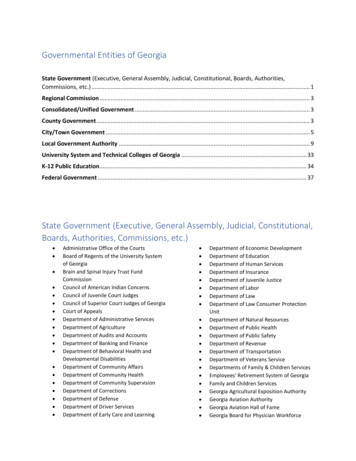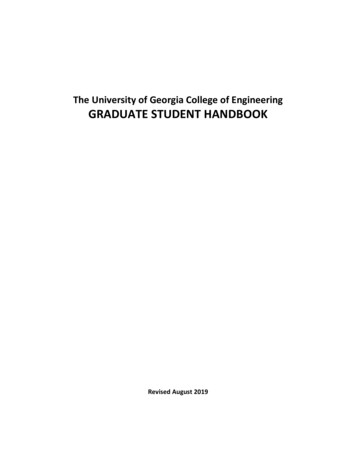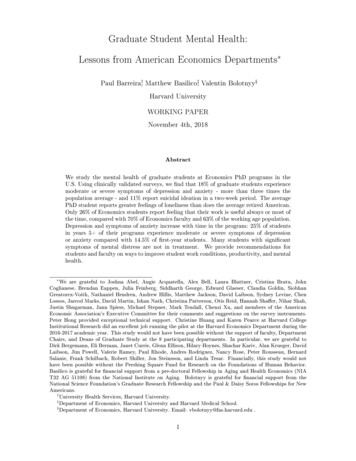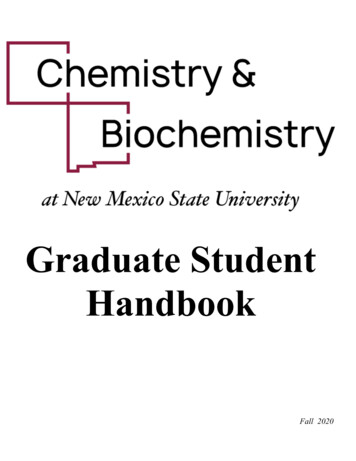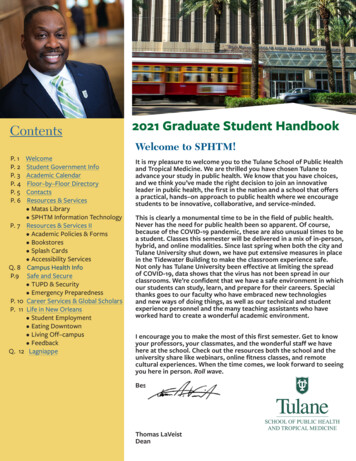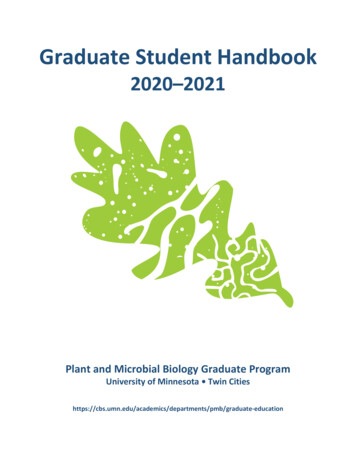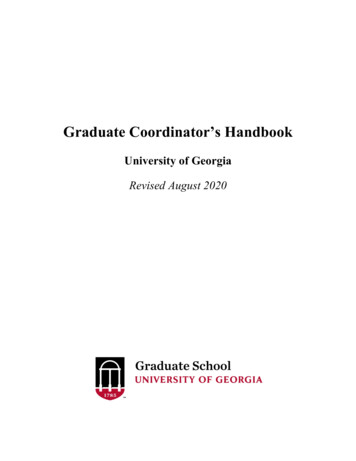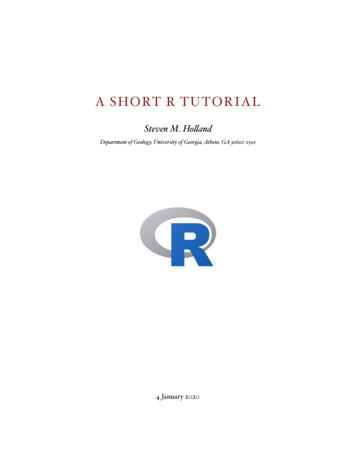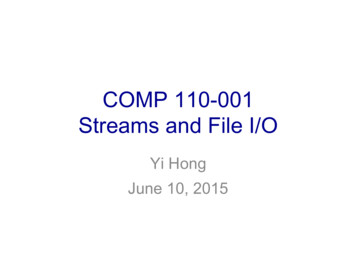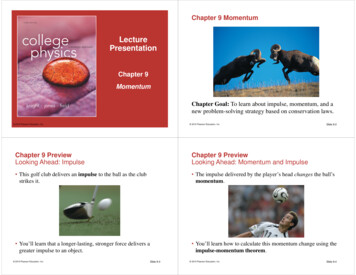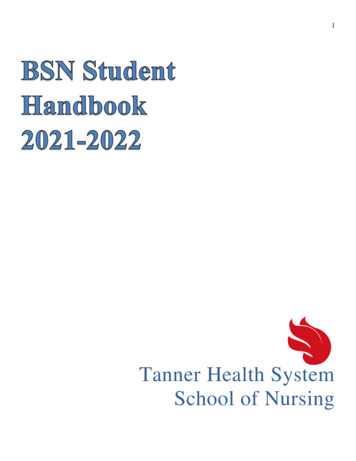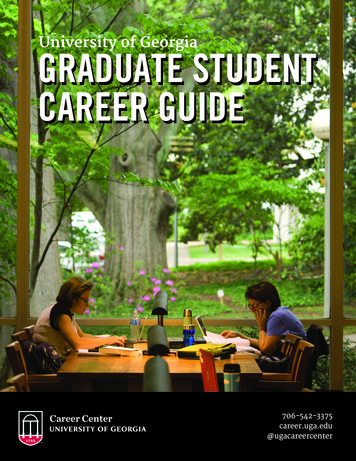
Transcription
University of GeorgiaGRADUATE STUDENTCAREER GUIDE706-542-3375career.uga.edu@ugacareercenter
--- Table of Contents ---IntroductionA Quick Guide to Our ServicesCareer Development PlanTransferable SkillsMake ConnectionsNetworkingInformational InterviewingLinkedIn8910CV vs. ResumeCV LayoutResume LayoutSection BreakdownAction VerbsDocument ExamplesConverting CVs into ResumesCover LettersAcademia Application Materials131416172022272829Job Search TimelinesOrganizing the Job SearchJob Search Tool KitJob Search Email Templates30323336Acing the Industry InterviewDress for SuccessTips for Skype and Phone InterviewsUltimate Guide to In-Person Interviews32 Sample Interview QuestionsAcing the Academic InterviewNegotiation 10139404243444546Application MaterialsJob SearchInterviewing346UGA GRADUATE CAREER GUIDE 2
A Quick Guide to Our Services--@ --The UGA Career Center offers many resources for all students and alumni. This guide not only outlines how wecan serve you as a graduate student, but also serve as a valuable tool to assist you in your career development.Your faculty members will teach you content in your field of study to build new knowledge applicable to yourfuture career in either academia or industry. We want to help you translate this knowledge onto your resume /CV and communicate it effectively during an interview.This guide will provide you with a framework to build your resume / CV and conduct a successful industry oracademic job search. It will also provide you with best practices for networking and tips for creating a new orstronger LinkedIn profile. Utilize the portions of the guide that are most applicable to you. See our servicesbelow if you feel like you need a more in-depth explanation or individualized feedback about your career-relatedquestions.The Career Center provides a wide variety of services to UGA students and alumni, including:1. Resume & CV Critiques and Creation2. Cover Letter Critiques and Creation3. Career Exploration (industry &academia)4. Professional Etiquette & Networking5. Employer Communication &Research6.7.8.9.10.11.Salary NegotiationInterview PrepJob & Internship Search StrategiesCareer Fair PrepSocial Media & LinkedInEvaluating Job OffersIndividual Career Counseling – Career Consultants are available to meet individually with students at anypoint during their time here at UGA. To find out the name and contact information for the designated CareerConsultant for your area of study, visit our website at career.uga.edu. You can schedule an appointment onlineby logging in to your Handshake account or by calling the Career Center, 706-542-3375.Drop-In Hours – Have a quick question? Stop by the Career Center Multipurpose Room on the second floorof Clark Howell Hall between 12 p.m. and 2 p.m., Monday-Friday, to meet with a Career Consultant for 10-15minutes. No appointment necessary.Satellite Hours – Check our website to find out when your Career Consultant will be holding satellite hourson campus at a location near you. Drop in during these times to ask quick questions. No appointment necessary.Mock Interviews – Have an interview coming up? Schedule a practice interview with your Career Consultantto make sure you are ready to face employers or faculty.Career Assessments – Learn how your personality, interests, values, and skills can help you choose a career.Handshake – This is your online job and internship board. Begin here when looking for internships and jobsfor UGA students and alumni; including part-time, full-time, and on- and off-campus opportunities.Online Career Resources – Under the “Resources” tab at career.uga.edu, check out the “Career Guides”link and “Online Resources” link for additional tools, including our Social Media Guide, the Vault Career Insider,the GoinGlobal Career Guide, and more.To access a full list of services, visit career.uga.eduUGA GRADUATE CAREER GUIDE 3
Career Development Plan-Master’s Student (2 year)@ -Year 1Explore Career Options Visit career.uga.edu and complete career assessments to help determine interests, values, and personality type; meetwith your Career Consultant to discuss your results Research career options using websites like Career Insider, O*Net, etc. Check out page 33 for more online resources.Get Involved & Build Your Network Join a graduate student organization or volunteer in an area of your interestAttend Career Center programs and graduate student workshopsJoin local chapters of professional associations related to your chosen fieldCreate a LinkedIn profile and start building your professional networkAttend a conference within your area of studyGet Experience Create a resume / CV and seek feedback from a Career Consultant, faculty member, and / or industry professional Attend career fairs and other recruiting events to chat with employers about employment opportunities Seek out internship / research / teaching opportunities within your field using your network of faculty, colleagues,friends, family, and the Career CenterYear 2Explore Career Options Work with your academic advisor to select electives to complement your interestsConduct informational interviews with people in potential careers to learn about optionsShadow professionals in chosen field of interestDetermine your top career choices and top employersStay Involved & Strengthen Your Network Interact with guest speakers and college personnel to create connectionsBecome a leader in graduate student organizations or professional associations related to your chosen fieldAttend or present at a conference within your area of studyAttend Career Center programs and graduate student workshopsIncrease Experience & Knowledge Complete an internship or secure a career-related part-time job Strengthen your interviewing skills by scheduling a mock interview with your Career Consultant Read magazines and journals to become familiar with career trends and areas of opportunityJob Search Update your resume / CV and have it reviewed by a Career Consultant, faculty member, and / or industry professional Create additional documents as needed (research statement, teaching philosophy, cover letter) and review them withyour Career Consultant, faculty member, and / or industry professional Create a timeline for your job search with deadlines for completing certain tasks Determine references (faculty, supervisors, etc.) and provide them with a copy of your resume / CV and other pertinentjob information Request recommendations on LinkedIn to strengthen your profile Research employers through company websites and social media accounts Participate in career fairs and other on-campus recruiting events related to areas of interest Meet with your Career Consultant to discuss salary negotiation Complete the Career Center’s Career Outcomes Survey to tell us what you are doing after graduationUGA GRADUATE CAREER GUIDE 4
Career Development Plan-Doctoral Student (5 years)@ -Year 1-2Explore Career Options Visit career.uga.edu and complete career assessments to help determine interests, values, and personality type; meetwith your Career Consultant to discuss your results Research career options using websites like Career Insider, O*Net, etc.Get Involved & Build Your Network Join a graduate student organization or volunteer in an area of your interestAttend Career Center programs and graduate student workshopsInteract with guest speakers and college personnel to create connectionsJoin local chapters of professional associations related to your chosen fieldCreate a LinkedIn profile and start building your professional networkAttend a conference within your area of studyGet Experience Create a resume / CV and seek feedback from a Career Consultant, faculty member, and / or industry professional Attend career fairs and other recruiting events to chat with employers about employment opportunities Seek out internship/ research/ teaching opportunities within your field by using your network of faculty, colleagues,friends, family, and the Career CenterYear 2-4Explore Career Options Conduct informational interviews with people in potential careers to learn about options Shadow professionals in chosen field of interestStay Involved & Strengthen Your Network Update your LinkedIn profile and request recommendations to strengthen your profileObtain leadership role(s) in a graduate student organization or professional association related to your chosen fieldAttend or present at a conference within your area of studyAttend Career Center programs and graduate student workshopsIncrease Experience & Knowledge Update your resume / CVComplete internship, research, or teaching opportunities or a career-related part-time jobStrengthen your interviewing skills by scheduling a mock interview with your Career ConsultantRead magazines and journals to become familiar with career trends and areas of opportunityYear 4 Narrow Your Career Options Determine your top career choices and top employersJob Search Update your resume / CV and have it reviewed by a Career Consultant, faculty member, and / or industry professional Create a timeline for your job search with deadlines for completing certain tasks Determine references (faculty, supervisors, etc.) and provide them with a copy of your resume / CV and other pertinentjob information Research employers through company websites and social media accounts Participate in career fairs and other on-campus recruiting events related to areas of interest Meet with your Career Consultant to discuss salary negotiation Complete the Career Center’s Career Outcomes Survey to tell us what you are doing after graduationUGA GRADUATE CAREER GUIDE 5
Transferable SkillsAs you plan your life after graduate school, it is important to evaluate the skills that you have developed duringyour time as a student. Use this table to reflect upon your experiences and your skill development. Knowing howyou have developed each skill will help you as you prepare for your life after UGA!Oral and WrittenCommunicationTeamwork andCollaborationCritical Thinkingand late thoughts/ideas clearlyand effectively in written & oralforms to persons inside & outsideof the organization. Developpublic speaking skills; able toexpress ideas to others; canwrite / edit memos, letters, andcomplex technical reports clearly &effectively.Build collaborative relationshipswith colleagues & customersrepresenting diverse cultures,races, ages, genders, religions,lifestyles, and viewpoints. Ableto work in team structure andnegotiate / manage conflict.You may have developedthis skill through Writing emailsWriting papersWriting grantsClassroom presentationsConference presentationsTeaching assistantshipExercise reasoning, analyze issues,make decisions, and overcomeproblems. Obtain, interpret andapply knowledge, facts, anddata; demonstrate originality /inventiveness.You may have developedthis skill through Group projectsStudent organizationsIntramural sportsWork experienceInternship experienceYou may have developedthis skill through Weighing graduate schooloptionsResearch projectsEvent planningClassroom projectsAdapted from the Career Readiness materials developed by the National Association of Colleges and Employers (NACE)UGA GRADUATE CAREER GUIDE 6
Why invest in developing these skills?Experience does not have to be glamourous to be valuable. You’ve gained skills throughout your academiccareer that are relevant to your job search. Often times, connecting academic experience to the job search isa challenge. Why is this? Typically, in classes or other academic settings, we think in subjects. In contrast, theworld of work thinks in skills. Employers report that they look for the skills listed below in candidates. Therefore,identifying how the skills you developed as a student transfer into the world of work is crucial. Your goal is toarticulate these skills on your resume, in your cover letter, and in a job interview. Your UGA Career Consultant ishere to help you in this endeavor!Digital TechnologyLeadershipProfessionalismand Work EthicDefinitionDefinitionDefinitionLeverage existing digitaltechnologies ethically & efficientlyto solve problems, completetasks, and accomplish goals.Demonstrates adaptability to new& emerging technologies.Leverage strengths of othersto achieve common goals; useinterpersonal skills to coach &develop others. Able to assess &manage your own emotions andothers’ emotions; use empatheticskills to guide & motivate;organize, prioritize, & delegatework.You may have developedthis skill through Social mediaMicrosoft officeWebsite development or designPortfolio developmentSpecialized certificationsDemonstrate personalaccountability & effective workhabits such as punctuality, workingproductively with others, timemanagement, understand impactof non-verbal communication onprofessional image.You may have developedthis skill through Classroom projectsStudent organizationsDevelopment of new initiativesfor your departmentYou may have developedthis skill through Engagement with the UGACareer CenterForming strong relationshipswith faculty / staff / graduateschool colleaguesInternships & work experienceAdapted from the Career Readiness materials developed by the National Association of Colleges and Employers (NACE)UGA GRADUATE CAREER GUIDE 7
NetworkingNetworking is a primary part of the job search. Your network consists of family, friends, professors, fellowstudents, professional organizations, and colleagues. Take advantage of the contacts that you currently have inyour graduate cohort and professors. All of these individuals are part of your network and can provide you withvital connections and opportunities in your job search.Tips for being successful at networking: Start early and continue networking throughout your entire college career and beyondSet deadlines for yourself to contact individuals in your network or develop new contactsMaintain your strong contacts and strengthen weak contactsFocus on building quality relationships with your contactsGive yourself opportunities to network by attending conferences, career fairs, or on-campus eventsRemember that networking is relationship building, not getting jobs from peopleSocial MediaSocial media sites like LinkedIn are obvious resources for expanding and maintaining your network, but keep inmind Twitter, Facebook, Instagram, etc. can alsobe utilized for networking. Make sure to use each social mediasite for its intended purpose. Instead of just focusing on cleaning up your “digital dirt”, use social media sitesto make a positive impression on your current network. If you’re not sure how to best utilize your social media,read our Social Media Guide to really assess your digital footprint.Professional OrganizationsProfessional organizations offer many opportunities for networking through conferences, online events orforums, and other interactive events. Target industry-specific associations to join and seek out graduate studentroles or groups within these organizations. Think about attending or presenting at a professional organizationconference to expand your network further.Campus ResourcesTarget UGA Career Center career fairs or other events that bring employers on campus from industries that alignwith your career interests. Your graduate program or department may also offer a variety of resources to helpconnect you with potential employers or professionals in the field.Join theTyson FoodsTeamA NSHIPANDFULL-TIMEOPPORlUNITIESIN Sak and f;nan eand-1n1onnab00SY"""'"'"""" ",::;:.::"" .,,.,,,.ch""9T UGA GRADUATE CAREER GUIDE 8
Informational InterviewsAn informational interview is an opportunity tospend time with a professional in a career field ofinterest. Informational interviews can help you buildyour network, tap into the hidden job market, andlearn unpublished details about a specific company,organization, or school. Follow the guidelines belowto ensure that you show respect for the time andenergy put forth by the professional you contact.Preparation Identify a professional to contact in a careerfield of interest to youResearch the professional and their organization/industryReach out via phone or via email to schedulePrepare for the informational interview usingsome of our sample questionsWhen arranging an informational interview,plan for the interview to take 30 minutes or lessPay close attention to the time so that you canrespect the professional’s scheduleSample Questions To Ask1.2.3.4.5.6.7.8.9.10.11.12.13.How did you get started in this field?What is your educational background?What are your major responsibilities?What is the most/least rewarding aspect of yourcareer?Would you choose this career again?What is a typical day like?What is the most common career path to lead towhere you are?What are some lifestyle considerations for thiscareer field?What are some common entry-level positions(or graduate programs) in the field of ?What kind of individual (skills/personality)would be best-suited for these entry-levelpositions?What are the most important factors used whenhiring?What is the future outlook for this career?Whatisthebesteducationalpreparation for a career in this field?14. Which classes and experiences would be mosthelpful to obtain while still in grad school?15. How high is turnover? How does one movewithin the organization?16. How do people find out about open positions inthis field?17. What are areas for potential growth/decline?18. How do you see jobs like yours changing in thefuture?19. Which professional journals/organizations wouldbe most helpful in evaluating the field?20. Who else do you recommend I talk with, andmay I have permission to use your name?21. Can you recommend other types of organizationsI might investigate or contact?Sample Script“Hello, my name is . I was given yourname/found your name by . I am a (classyear) at UGA and am interested in arranging aninformational interview to learn more about yourjourney to . Please let me know when wouldbe a good time for me to meet with you over thephone, in person, or via online video for a half hourconversation. I am happy to provide dates and timesthat are suitable for my schedule should you findthis more convenient.”UGA GRADUATE CAREER GUIDE 9
Using LinkedIn StrategicallyLinkedIn is a social media site that allows you to connect with fellow members including colleagues, peers,and potential employers. This site can be a wonderful tool for the job search and to develop your network as agraduate student. Taking advantage of the opportunities through LinkedIn can be done in many ways.Career InsightsLinkedIn offers a Career Insights tool (previously called LinkedIn Alumni Tool) that provides a database ofthousands of alumni. You can search alumni according to location, company, or industry type to identify LinkedInmembers with careers in your areas of interest. This tool is helpful during the job search to pinpoint job titles orcompanies that match your career interests. Look for LinkedIn members who work in your dream job. Observingtheir previous positions or education can help you identify steps you might take to be successful. Career Insightsis also beneficial for networking with alumni from both your graduate and undergraduate institution.The University of GeorgiaAthens, GAUNIVEHSITYOF'GEORGIA@@I Following163,099 alumni0 24.190,831 followers27 connections work here. See all 10,671 employees on LinkedIn -- See alumniReach out to alumni with similar interests using a customized message describing your intent:“Dear Mr. Smith, I am currently a second-year graduate student at UGA studying Environmental Health Scienceand hoping to enter the public health industry. I noticed on your profile that you are also a UGA alumnus withexperience in this field. I would love the o
Doctoral Student (5 years) Year 1-2 . Explore Career Options career.uga.edu and complete career assessments to help determine interests, values, and personality type; meet Visit with your Career Consultant to discuss your results Research career options using websites like Career I
